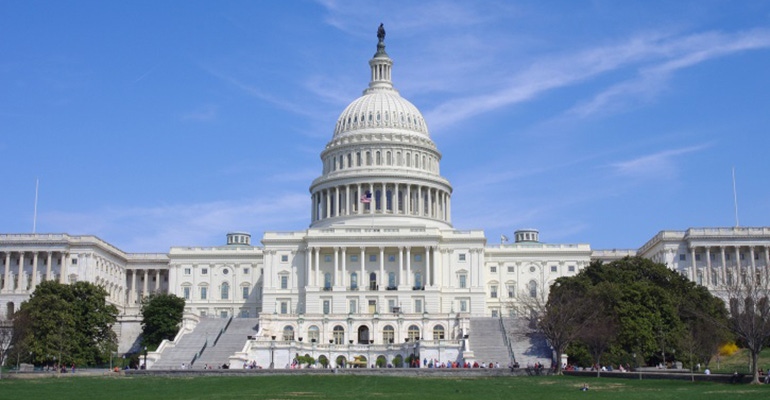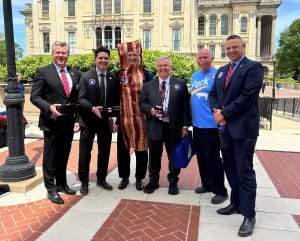White House announces steps to help port congestion
Legislative Watch: AMS’s webinar series on LMR and pork; Debt ceiling avoids government default; Increase USDA's role in approval of foreign ownership in U.S. ag.

The congestion at the ports in Southern California is continuing to negatively impact the U.S. economy. This week, the Department of Labor (DOL) announced that inflation had increased 5.4% over last year, the highest rate increase since 2008. DOL attributed that worker shortage and supply chain disruptions were key factors in the increase.
The White House announced a series of public and private commitments that were being taken to address the congestion at the Southern California ports. The steps being taken are to improve the flow of both inbound and outbound products that use ocean transportation.
Commitments announced by both public and private entities to help increase shipments include:
The Port of Los Angeles is expanding to 24/7 operation. They join the Port of Long Beach, which expanded operations in mid-September.
The International Longshore and Warehouse Union (ILWU) announced its members are willing to work extra shifts to help add capacity in clearing existing backlogs.
Companies will use expanded hours to move more cargo from the docks. Walmart, UPS, FedEx, Samsung, Home Depot and Target announced they will take steps by increasing the use of night-time hours to move more containers. These six companies will be able to move 3,500 more containers per week at night by the end of the year.
President Joe Biden announced a Supply Chain Disruptions Task Force in June to identify emerging bottlenecks to the economic recovery.
AMS’s webinar series on LMR and pork
USDA's Agricultural Marketing Service is holding a series of webinars on USDA's Livestock Mandatory Reporting program with a focus on pork. The first webinar this past Tuesday was entitled "Overview of USDA Reports for the Pork Industry." The webinar on the Oct. 19 will be "USDA LMR Live Swine Reports" and the Oct. 26 webinar will be "USDA LMR Wholesale Pork Reports." To register for the webinar series, go here.
Short term debt ceiling avoids government default
The Senate and House of Representatives passed legislation on party line votes to raise the debt ceiling by $480 billion, thus avoiding an unprecedented government default. This will cover U.S. borrowing authority until December 3. Experts had warned a default by the federal government would be devastating to the economy.
Raising the debt ceiling is for paying off existing obligations instead of new ones.
Increase USDA's role in approval of foreign ownership in U.S. ag
Senator Tommy Tuberville, R-Ala., has introduced the "Foreign Advisory Risk Management (FARM) Act" that would include the Secretary of Agriculture as a member of the Committee on Foreign Investment in the United States (CFIUS).
CFIUS is a federal government inter-agency committee that reviews national security implications of foreign investments in U.S. companies or operations. The committee has representatives from 16 departments and agencies, including the Departments of Commerce, Defense, Homeland Security, State, and Treasury. The Secretary of the Treasury serves as chair.
Tuberville said, "Food security is national security, which is why the agriculture industry needs a seat at the table for the foreign investment vetting process. By adding agricultural supply chains as a covered transaction for CFIUS review, we can safeguard our food supply chains and agriculture industry from bad actors."
The bill would:
add the Secretary of Agriculture as a member to CFIUS;
add language to protect the U.S. agriculture industry from foreign control through transactions, mergers, acquisitions, or agreements; designate agricultural supply chains as critical infrastructure and critical technologies,
and report to Congress on current and potential foreign investments in the U.S. agricultural industry from the United States Department of Agriculture (USDA) and Government Accountability Office (GAO).
Congressional members have raised concerns in the past concerning USDA not being a member of CFIUS when U.S. agricultural companies were purchased by foreign companies, including Smithfield, JBS, and Monsanto.
Congressmen Filemon Vela, D-Texas, and Ronny Jackson, R-Texas, introduced the bill in the House.
Torres Small confirmed undersecretary for rural development
The U.S. Senate confirmed former U.S. Representative Xochitl Torres Small as USDA undersecretary for rural development. Torres Small served one term in the House of Representatives and served on the House Agriculture Committee.
Sources: P. Scott Shearer, who are solely responsible for the information provided, and wholly own the information. Informa Business Media and all its subsidiaries are not responsible for any of the content contained in this information asset.
About the Author(s)
You May Also Like


